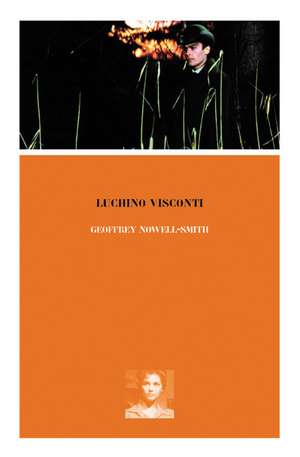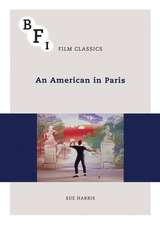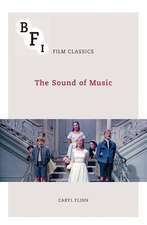Luchino Visconti
Autor Geoffrey Nowell-Smithen Limba Engleză Paperback – mar 2003
Preț: 233.46 lei
Nou
Puncte Express: 350
Preț estimativ în valută:
44.67€ • 46.77$ • 36.96£
44.67€ • 46.77$ • 36.96£
Carte tipărită la comandă
Livrare economică 05-19 aprilie
Preluare comenzi: 021 569.72.76
Specificații
ISBN-13: 9780851709611
ISBN-10: 0851709613
Pagini: 250
Ilustrații: illustrations
Dimensiuni: 155 x 235 x 19 mm
Greutate: 0.48 kg
Ediția:3rd ed. 2003
Editura: British Film Institute
Colecția British Film Institute
Locul publicării:London, United Kingdom
ISBN-10: 0851709613
Pagini: 250
Ilustrații: illustrations
Dimensiuni: 155 x 235 x 19 mm
Greutate: 0.48 kg
Ediția:3rd ed. 2003
Editura: British Film Institute
Colecția British Film Institute
Locul publicării:London, United Kingdom
Notă biografică
Geoffrey
Nowell-Smith
is
Professor
of
Cinema
Cultures
at
the
University
of
Luton.
His
recent
publications
include
a
study
of
Antonioni's
L'avventura
for
the
BFI
Film
Classics
series.
Textul de pe ultima copertă
Aristocrat
and
Marxist,
master
equally
of
harsh
realism
and
sublime
melodrama,
Luchino
Visconti
(1906-1976)
was
without
question
one
of
the
greatest
European
film
directors.
His
career
as
a
film-maker
began
in
the
1930s
when
he
escaped
the
stifling
culture
of
Fascist
Italy
to
work
with
Jean
Renoir
in
the
France
of
the
Popular
Front.
Back
in
his
native
country
in
the
40s
he
was
one
of
the
founders
of
the
neo-realist
movement.
In
1954,
with
Senso,
he
turned
his
hand
to
a
historical
spectacular.
The
result
was
both
glorious
to
look
at
and
a
profound
reinterpretation
of
history.
In
Rocco
and
His
Brothers
(1960)
he
returned
to
his
neo-realist
roots
and
in
The
Leopard
(1963),
with
Burt
Lancaster,
Claudia
Cardinale
and
Alain
Delon,
he
made
the
first
truly
international
film.
He
scored
a
further
success
with
Death
in
Venice
(1971),
a
sensitive
adaptation
of
Thomas
Mann's
story
about
a
writer
(in
the
film,
a
musician)
whose
world
is
devastated
when
he
falls
in
love
with
a
young
boy.
A
similar
homo-erotic
theme
haunts
Ludwig
(1973),
a
bio-pic
about
the
King
of
Bavaria
who
prefers
art
to
politics
and
the
company
of
stableboys
to
the
princess
he
is
supposed
to
marry.
Geoffrey
Nowell-Smith's
classic
study
of
the
director
was
first
published
in
1967
and
revised
in
1973.
It
is
now
updated
to
include
the
last
three
films
that
Visconti
made
before
his
death,
together
with
some
reflections
on
the
'auteur'
theory
of
which
the
original
edition
was
a
key
example.












